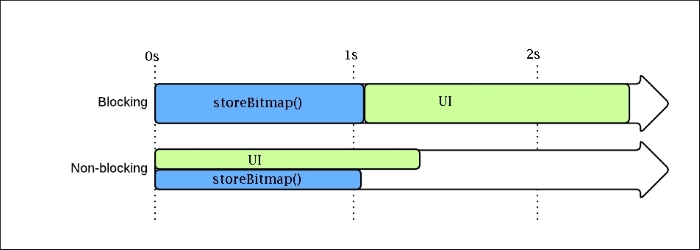Now that we know how to schedule a task on an I/O-specific Scheduler, we can modify our storeBitmap() function and check the StrictMode violation again. For the sake of our example, we can rearrange the code in a new blockingStoreBitmap() function:
private static void blockingStoreBitmap(Context context, Bitmap bitmap, String filename) {
FileOutputStream fOut = null;
try {
fOut = context.openFileOutput(filename, Context.MODE_PRIVATE);
bitmap.compress(Bitmap.CompressFormat.PNG, 100, fOut);
fOut.flush();
fOut.close();
} catch (Exception e) {
throw new RuntimeException(e);
} finally {
try {
if (fOut != null) {
fOut.close();
}
} catch (IOException e) {
throw new RuntimeException(e);
}
}
}Now, we create our nonblocking version using Schedulers.io():
public static void storeBitmap(Context context, Bitmap bitmap, String filename) {
Schedulers.io().createWorker().schedule(() -> {
blockingStoreBitmap(context, bitmap, filename);
});
}Every time we call storeBitmap(), RxJava takes care of creating all it needs to execute our task on a specific I/O thread from the I/O thread pool. All the operations are performed away from the UI thread and our app is 1 second faster than before: no more StrictMode violations in the logcat.
The following figure shows the two different approaches we saw in the storeBitmap() scenario:

..................Content has been hidden....................
You can't read the all page of ebook, please click here login for view all page.
